Content Sections
Up until recently, most people, whether members of the public or health professionals, thought a gluten free diet was only for the 1% or so of people diagnosed with coeliac disease. As research progresses and results from clinical practice emerge, we now know that gluten (a protein found in some grains) and associated proteins (gliadins and glutenins) can contribute to health issues in a much wider part of the population. The spectrum of gluten-related disorders broadly spans three categories: auto-immune, allergic and non-autoimmune/non-allergic conditions.
Gluten-related disorders
Widely acknowledged as the world’s leading expert on gluten-related disorders, Dr Alessio Fasano MD, along with his former team at the University of Maryland School of Medicine, Baltimore, proposed the following classification of the disorders (Figure 1), which may even be too simplistic.
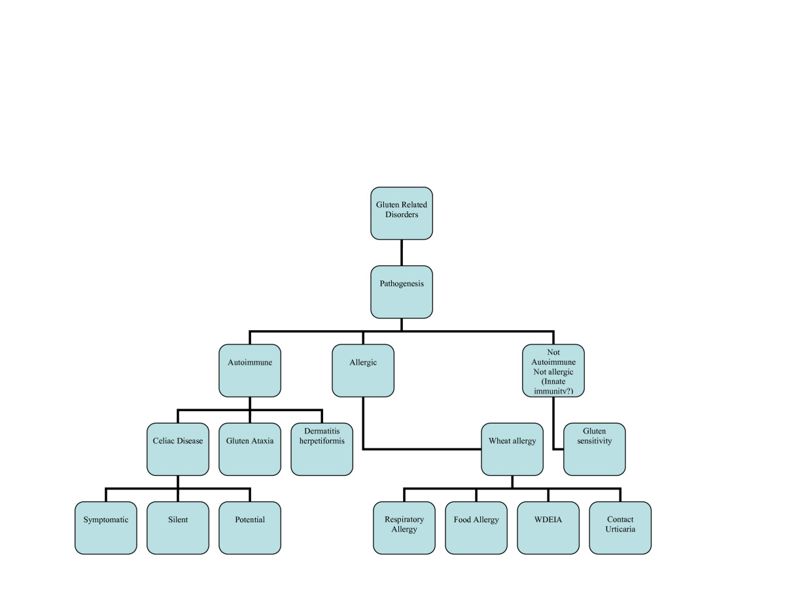
Figure 1. Source: Sapone et al. BMC Medicine 2012, 10:13.
Included among those affected by gluten are therefore not only coeliacs, but also people who suffer from wheat allergy (Ig-E and non-Ig-E-mediated) and those who have, what is now referred to, as Non-Coeliac Gluten Sensitivity (NCGS). First referred to in the 1980s, NCGS is the term used to describe individuals suffering a range of symptoms, not linked to auto-immune disease, that quickly improve after gluten is removed from the diet, and in which both coeliac disease and wheat allergy were properly ruled out. If gluten exposure is maintained, there is a risk that very serious conditions, such as autoimmune thyroiditis, may occur in around 1% of the NCGS population, itself difficult to estimate given the low rates of reporting and medical diagnosis.
Making matters even more complicated is the scale of under-reporting linked to gluten-mediated type 1 diabetes and cancer, both of which are triggered via autoimmune reactions (Figure 1). These conditions are frequently undiagnosed as being gluten-mediated and being forms of 'silent coeliac disease', they result from years, or decades, of chronic exposure to gluten.
A prevailing view among the medical establishment is that less than 10% of the population would benefit from wheat exclusion. Taking then a conservative estimate of 6% of the population being affected by gluten-related disorders, that still equates to 3.9 million Brits and 19.4 million Americans being affected and unequivocally benefiting from going gluten free. And that’s a conservative view! That’s enough to ensure anyone suggesting gluten free is a fad is either ignorant of the facts or they have no interest in public health.
While insightful nutritional and functional medicine practitioners have for several years witnessed remarkable turnarounds in their patients’ health, more recently many 'celebrities' and ‘healthy eating' gurus have begun to extol the health benefits of not eating gluten containing grains. That’s triggered a push back that one can be certain is supported directly or indirectly by corporations benefiting from our common intolerance or sensitivity to the main Western staple.
In devising our Food4Health guidelines, we looked not only at the most relevant published science, but also at clinical experience, which led to us taking the unprecedented step of offering a plate-based guideline back in January 2015 that was 100% gluten free.
Fasano on gluten
Given last week’s BBC Horizon programme put Dr Fasano in the hot seat as the most credible scientist offering a view on going gluten-free, and somehow, through various tricks of editing, he appeared to say something different, we too look to Dr Fasano for his views. The programme tackled what it called ‘clean eating’, apparently a fad diet being put around by ‘clean eating gurus’ in such places as Britain, the USA and Australia. The centrepiece of the show was an attack on the current 'trend' for removing gluten from a person's diet. It was unfortunate that instead of finding that eating healthily without gluten is scientifically sound Fasano appeared to suggest that gluten was only a problem for those with underlying genetic predisposition, imbalanced gut microbes, faulty immune systems and leaky guts. We now know that gluten can affect our body in multiple ways (Figure 2), but various factors are needed for gluten sensitivity to develop. We explore the science further to see how they influence the way gluten contributes to make a perfect storm and create the conditions for chronic disease to develop.
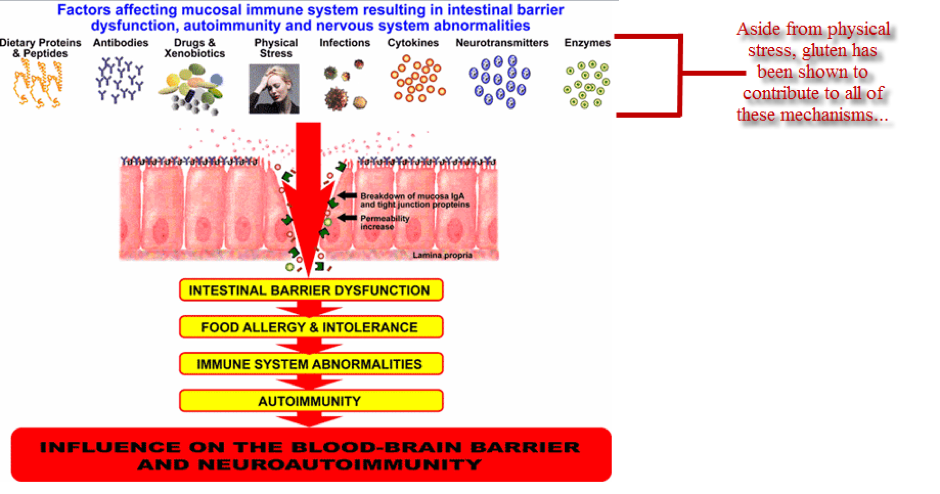
Genetic Disposition
Coeliac disease develops when a genetically susceptible person is exposed to gluten. It has also been suggested that there is a genetic factor in the development of NCGS. Dr Fasano is clear that having a genetic disposition does not mean you will develop a particular disease, it depends on other factors, most notably the health of our microbiome. It's like playing a piano "you can't change the piano keys, but you can change the notes you play".
Imbalanced microbiome
A healthy gut microbiome (bacterial population) is essential to the development of a healthy immune system (Figure 3).
Figure 3. Alessio Fasano, MD, slide from keynote presentation (IM Network Forum, 2016)
Changes to the health of our microbiome can take place due to antibiotic (or other medication) use, poor eating habits (lack of fruit & veg, high processed foods and sugary foods), stress etc. More and more research is pointing to disruption of our gut microbes as a starting place for the development of disease. Once we develop dysbiosis (damage to gut health) we set the stage for gluten to become a problem, to promote further inflammation and damage to the gut. Dr Fasano tells us that "what happens in the gut does not stay in the gut", in other words inflammation in the gut can spread to the rest of the body (Figure 4).
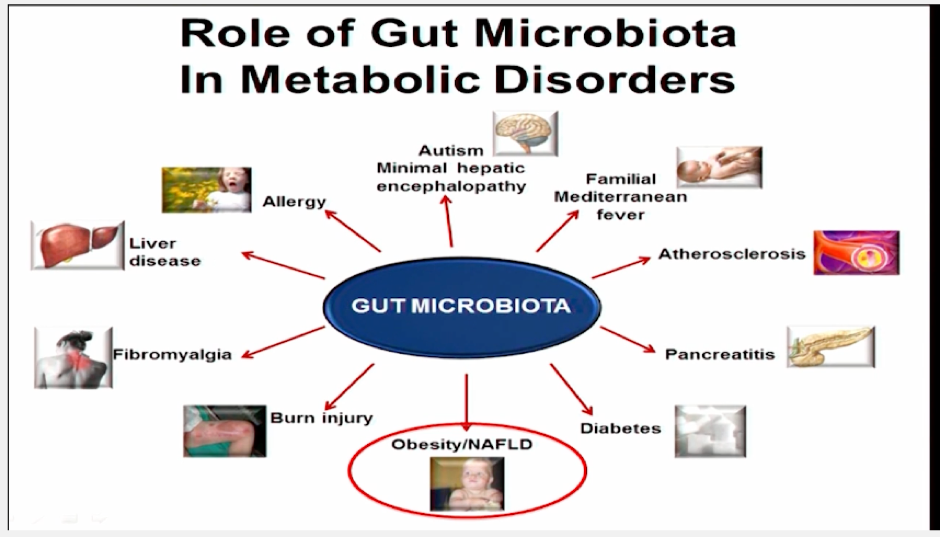
Figure 4. Alessio Fasano, MD, slide from keynote presentation (IM Network Forum, 2016)
Leaky gut
One of the most important and overlooked functions of the gastrointestinal tract is its role in protecting us from unwanted molecules entering our bloodstream. Back in 2000 Fasano and his team discovered a protein they named zonulin, which regulates the opening and closing of gateways in the gut wall to ensure that what should stay in the gut stays there and what should go into the body does (gut integrity). Further research discovered that gluten, a key protein in most people's diets, changes the way zonulin functions. Zonulin evolved for a very specific purpose. If we ingest some nasty bacteria in our food, the tight junctions in our gut wall open to allow our gut contents to leak into our abdominal cavity so that they can be exposed to our full battery of immune cells. This is something we hope happens occasionally – the less often the better. Eat gluten regularly, perhaps 6 times every day, especially if you lean towards having a greater sensitivity to the ubiquitous grain protein (an affliction probably faced by more than 1 in every 10 of us) and we start to suffer a permanently activated, or ‘upregulated’, immune system.
Impaired immune system
Autoimmune disease is an illness that occurs when our body is attacked by its own immune system and includes diseases like rheumatoid arthritis, lupus, Hashimoto’s and coeliac disease.
Our gut is unable to breakdown gluten-containing grains fully, leaving behind another protein component, gliadin. This activates zonulin, which opens the doors in our gut (tight junctions), and stimulates our immune system to produce antigliadin antibodies leading to inflammation that then spreads through our body in the form of autoimmune illness. Research has found the autoimmune response is damped down if you take gluten out of the diet.
Our Advice
Daily consumption of wheat and wheat products, as well as other cereal grains is not advised as its contribution to chronic inflammation and autoimmune disease manifestation is both well documented and common. Even more importantly, most people have little idea as to where they sit in terms of their overall risk to gluten especially given that some effects, including serious ones, may not manifest clinically for years (e.g. silent coeliac disease).
Going gluten free is no fad, especially when it’s linked to eating real food made mainly at home from fresh ingredients that have yet to see a bar code. It’s about getting in touch with our evolutionary heritage (Evosense), given that anatomically modern humans have spent only around one-tenth of their existence being exposed to gluten-containing grains like wheat (incuding spelt, kamut, farro, durum), barley, rye and triticale. Add to this, our much more recent obsession with refining these grains to within an inch of their lives – and not only is the gun loaded and the trigger pulled – the bullet has been fired. Run as fast as you can – your life — and its quality — depend on it!
For more information on how gluten 'works' and autoimmunity develops along with tips about managing a gluten free diet, we suggest you read Dr Fasano's hugely successful book Gluten Freedom.
Recipes
For recipes, we suggest you look at one or more of the following, tuning into their books, social media outputs or other commentary.
UK-based:
US-based:
Click the infographic below for a comparison between the ANH-Intl Food4Health Guidelines and the UK Eatwell Guide
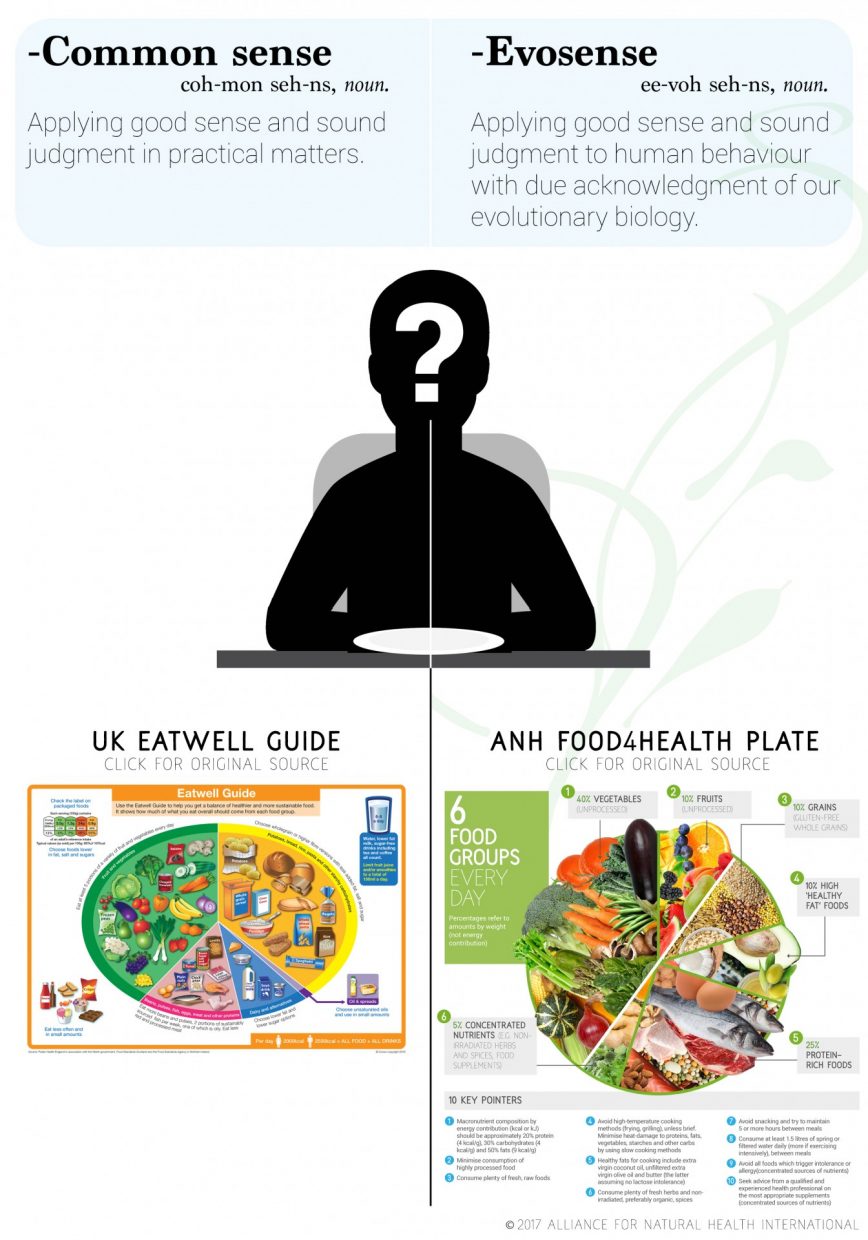





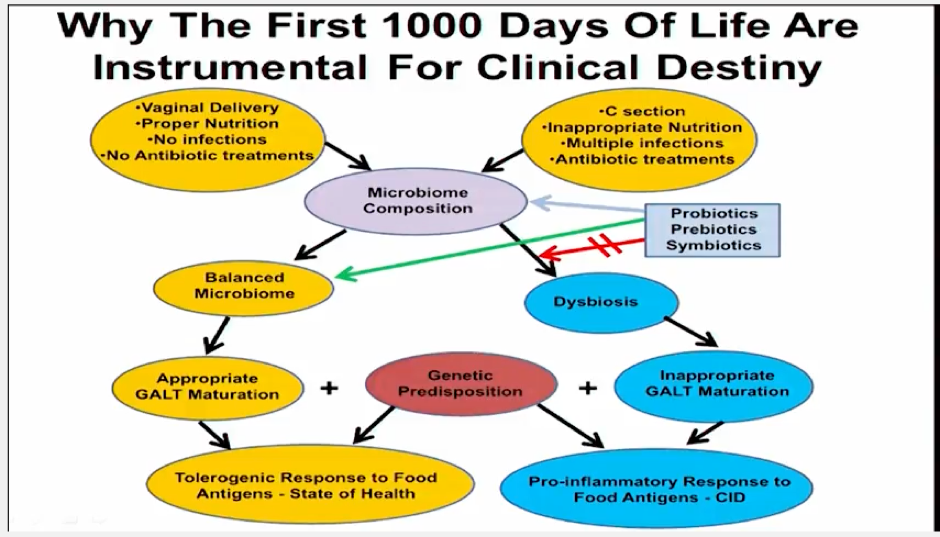



Comments
your voice counts
25 January 2017 at 9:24 pm
Of course, what makes wheat even worse now is the spraying of chemicals on to it.
26 January 2017 at 9:41 am
It certainly doesn't help Trevor!
Warm Regards
Melissa
27 January 2017 at 7:55 am
Absolutely the elephant (Monsanto) in the room!
25 January 2017 at 9:32 pm
I read a lot about gluten-free, but I think my trouble is wheat, not gluten per se. I tried Macrobiotics for a while and was amazed it worked for me (until I started travelling - much harder on the move). Macrobiotics says to avoid the potato (nightshade) family - which includes tobacco. (How long did I say I was allergic to tobacco to try to stop people smoking all over me??? Turns out I was speaking the truth all along...) The thing I'm finding now is, if I eat gluten free, I often get potato starch, then all my problems come back with a vengeance. From my personal blend of allergies, I'll take the wheat problems over the nightshades any day - or at least 95 out of 100.
26 January 2017 at 9:40 am
Thanks for commenting Andrea, we appreciate your thoughts.
Warm Regards
Melissa
26 January 2017 at 8:48 am
Thank you for this well balanced and full, article.
26 January 2017 at 9:37 am
Thank you Isabel
Warm Regards
Melissa
30 January 2017 at 10:30 am
I feel the chemical component deserves more clarification here - as the practice of 'ripening' wheat and other crops by effectively killing the crop with glyphosate to force 'ripening' as a convenience for growers. Stephanie Seneff's studies look at this.
Our living biology (body/brain) is a symbiosis of positive synergism - but we are becoming aware of negative or life-destructive synergies that are not just co-factors of cummulative effect - but pathways of biochemical action whose effect is greater than the sum of their parts - and cannot truly be understood in terms of parts. Though it can be understood at the level of Idea, as the wish-desire-intent of control or power OVER Life by the subjection or sacrifice of Life to the filtering distortion of the idea OF power OVER - which IS the idea OF separation, opposition and usurping of Life to a disconnected 'mentality' presumed to use Life and GET from it - so as to protect and reinforce self in IMAGE or concept - at expense of the Felling of Being - which is not emotional reactivity but the Informational energy of guidance, direction and support of a balanced and integrated RELATIONAL experience. Shared at its root or source - rather than sharing by a collectivisation or combination of fragments.
Even as the explorations of the scientific specialisation of conscious enquiry into the manifest world uncover information that opens new perspectives (that an old paradigm identity works to deny) - it is because the FIELD of our being is operating the inspiration and support for a genuine enquiry - even if alloyed with elements of the divide and rule control mentality.
Working WITH our true Nature is not only working with perceived external processes, but opens to a reintegrative perspective - also known as 'healing' unto Life.
But wishfulness of 'healing' powers or modalities can operate a distortion on the self-honesty required. perhaps the glyphosate 'ripening' is mirroring the destructive synergy of our times - killing or denying our manifest expression of existence - yet operating the Will to Life as the unified intent to SEED Life. IF we don't wake to a unified appreciation of being - we can propagate fear and division, with alarm as a call to war - or as collapse under an overwhelming sense of powerlessness - instead of a call to Wake to the way of - to the living Field of - inspiration for being the true of ourselves.
Health is not imported - but false idea can be. False idea can be released - allowing true to come in that is then recognized to have always been. The presumption of lack or sickness is not the full and true foundation from which to live - but it can operate the Call to directly or radically get WITH or open TO a true and living foundation - that is not COERCIVE over us - but which seems so when we set ourselves up to fail and can no longer support or maintain a distorted perspective identity. So at a deeper level - even the negative is part of a wholeness - in due place and proportion - such as a pain response to damage.
I look appreciate science that recognizes true feedback both within and 'without' and works WITHIN a true service to Life as the joy of true endeavour - rather than a fear or problem defined slave technician serving corporate (collectivised) agenda.
The survival instincts are similarly appropriate as an automatic feedback response of fight or flight - but the lockspin into a fear-based identity triggers this as a pervasive immuno-suppressive urge that then activates in a negative synergy of identifying against and in fear of Life. The idea of anti-life or evil is the fruit of such un-recognized, and protected fear operating out of denials believed as Fact.
The resources available to us for healing are unimaginably beyond the self-definitions we frame our lives within - and feel protected by - and yet we can only work from an acceptance of where we are - as a stepping stone or portal into the more of what we truly are. Fatalistic premature conclusions assert identity against change as if to protect the fragment left and focus exclusively in it as one's survival.
Thanks for the comment box - and thanks for working as an agent for integrative change at the national and international level.
17 August 2023 at 10:59 am
Thank you for the link to the research paper - finally I feel I have proof! My daughter suffered auditory & visual hallucinations due to gluten during a time of high stress which ceased when on a strict GF diet. Now if she has gluten foods by accident she'll have sever anxiety and very low-mood. During my masters' research (which was an exploration into the motivation for gluten avoidance in the absence of coeliac disease) a participant mentioned putting on significant weight simply by eating a slice of bread. Thanks to the mice I better understand the mechanisms of action!
Your voice counts
We welcome your comments and are very interested in your point of view, but we ask that you keep them relevant to the article, that they be civil and without commercial links. All comments are moderated prior to being published. We reserve the right to edit or not publish comments that we consider abusive or offensive.
There is extra content here from a third party provider. You will be unable to see this content unless you agree to allow Content Cookies. Cookie Preferences